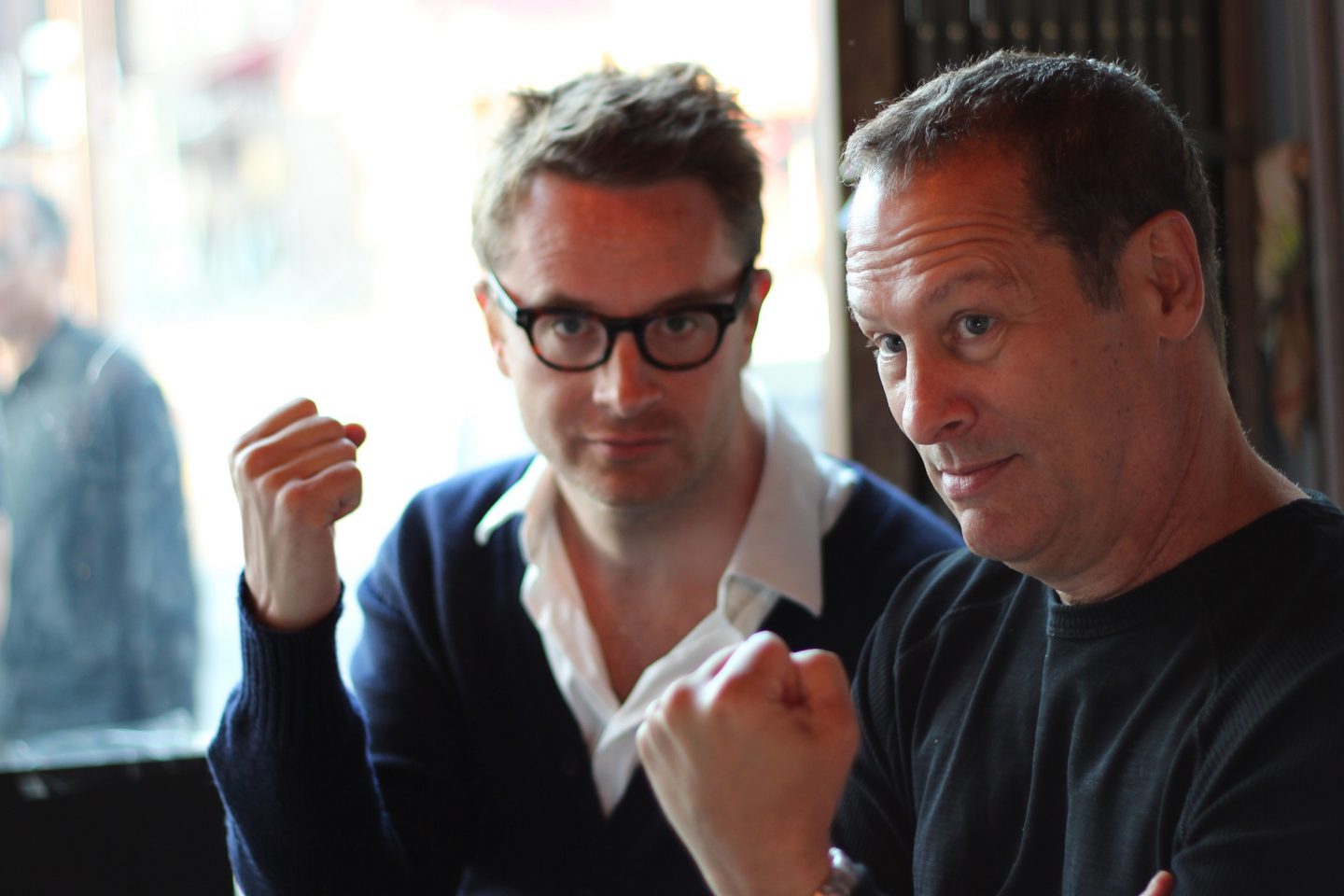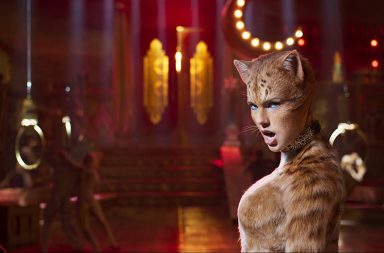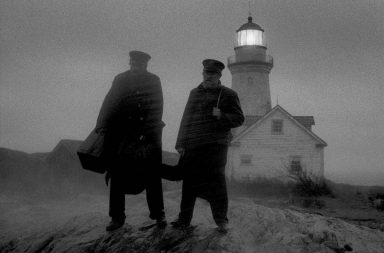There are a thousand reasons not to love the Cannes Film Festival – unless you are a die-hard Ken Loach, Pedro Almodóvar, Woody Allen or Xavier Dolan fan, in which case you can find a good reason to be there each year. Because, yes, one of the main reasons not to love the Cannes Film Festival is its line-up’s ever-growing predictability, and all of the aforementioned directors made it to the official selection – minus Allen – as it is often, if not always, the case with them. Which, well, leaves little room for possible surprises. Or does it? From the point of view of film scores, there might be more than one unexpected thing from unexpected composers to pop up to your ears…
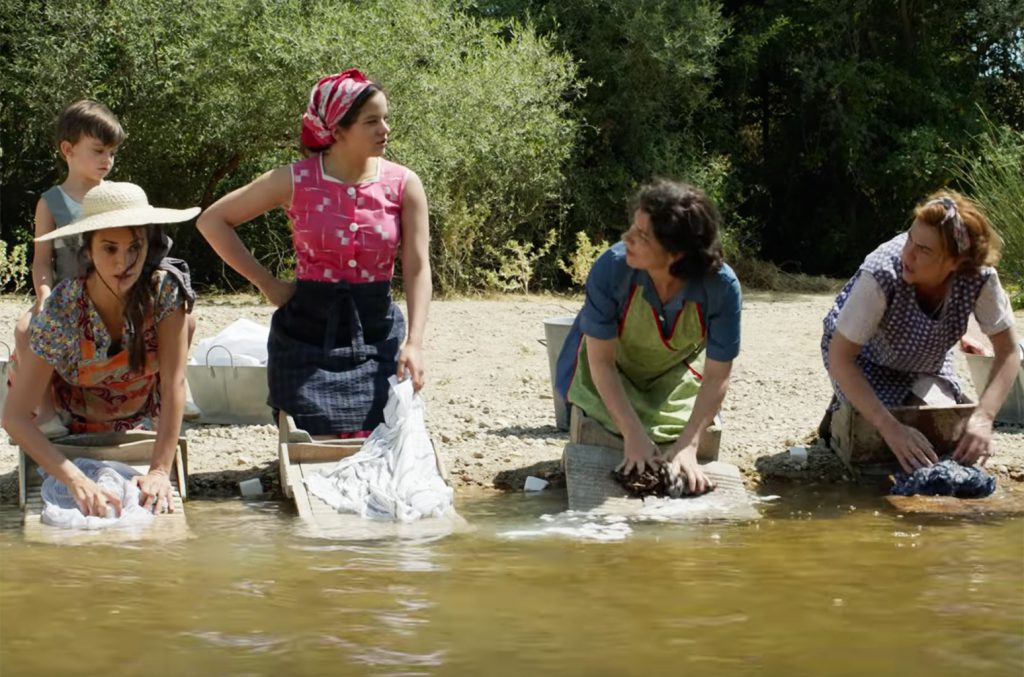
Penélope Cruz and Rosalía (on the left) in Pedro Almodóvar’s Pain and Glory. Music by Alberto Iglesias (El Deseo. All rights reserved.)
Official Selection – Competition
The Dead Don’t Die (Jim Jarmusch).
There is still no composer(s) attached to Jim Jarmusch’s much anticipated zombie flick, but we can find enough names among the film’s all-star cast to get excited by what the soundtrack could sound like. Iggy Pop, RZA, Selena Gomez and Tom Waits are all part of this small-town zombie odyssey, and since almost all of them regularly work with the director we can only hope to hear them at some point in the soundtrack. Meanwhile, the teaser features the song ‘Backstabber’ from Dutch garage rock band Beans & Fatback, and we have enough trust in Jarmusch for him to put together a crazy, funky selection of music to make the zombie massacre even more delightful.
Dolor y gloria / Pain and Glory (Pedro Almodóvar). Music by Alberto Iglesias.
Catalan singer/songwriter Rosalía makes her film debut in Pedro Almodóvar’s autobiographical drama Pain and Glory, and you can even see her sing with Penélope Cruz in the film’s trailer – Pain and Glory was released in March in Spain. Alberto Iglesias steps forward again for his eleventh collaboration with Almodóvar, and a score that, we can guess, will be heavy on emotions. Anyway, they got us at Rosalía and Penélope Cruz singing together…
Il traditore / The Traitor (Marco Bellocchio). Music by Nicola Piovani.
Marco Bellocchio’s twenty-fourth feature film is one of the highest expectations of Italian cinema this year. The director’s films confront themes such as political commitment, rejection of all forms of authority, rage and death. His latest feature, The Traitor, tells the story of Mafia boss turned informant Tommaso Buescetta, and marks his seventh collaboration with composer Nicola Piovani, after a… 37-year hiatus. Piovani was discovered by Bellocchio in 1970 and their reunion really is surprising – in a good way.
Les Misérables (Ladj Ly). Music by Mark Sauner.
Ladj Ly, a member of the filmmaker collective Kourtrajmé – other members include Kim Chapiron (Dog Pound) and Romain Gavras (The World Is Yours) – makes his debut with Les Misérables, a long-feature adaptation from his eponymous 2017 short. There will be no Anne Hathaway singing I Dreamed a Dream in this one, though, because these “Miz” are a group of cops in the north-eastern suburbs of Paris. Although the director talked about it as a comedy, we can expect a disturbing film, given its setting. The score is composed by Mark Sauner from the rare but excellent Canadian post-punk band Pink Noise, who is signing his first film score.
A Hidden Life (Terrence Malick). Music by James Newton Howard.
The love/hate relationships between Terrence Malick and his composers go way back… There is a long list of names in which we can find established artists like Ennio Morricone and James Horner, as well as undisputable chameleon composers like Alexandre Desplat or Hans Zimmer. James Newton Howard is somewhere in between. Over the past few decades, he has developed a sound that is all his, thanks to his fruitful collaboration with M. Night Shyamalan. But to convince Malick on a one-timer is another kettle of fish, and we will watch the director’s WWII drama fingers crossed, hoping to hear some shattering ambient pieces from the man who, despite having scored some of the biggest blockbuster hits of the past twenty years, still is one of America’s most underestimated film composers.
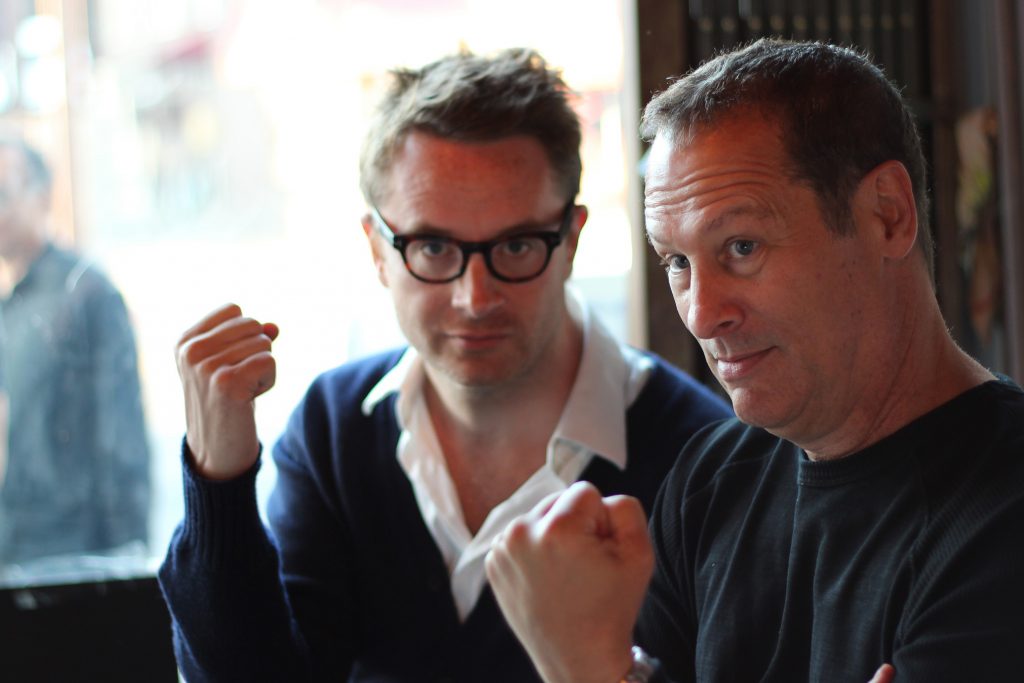
Nicolas Winding Refn (left) and Cliff Martinez (right). The now inseparable pair worked together for the 4th time on the Amazon Prime series Too Old to die Young, which will premiere in Cannes. (All rights reserved.)
Official Selection – Out of Competition and Special Screenings
Diego Maradona (Asif Kapadia). Music by Antonio Pinto.
The contemporary legend who, once again, is the subject of what is probably going to be another unmissable Asif Kapadia documentary, is no less than Diego Armando Maradona. The footballer’s life — from his rise to the status of living legend to suddenly his fall as an in-debt, cocaine-addicted alcoholic with a tattoo of Fidel Castro on his left calf — is a boon to every accomplished documentary filmmaker, Kapadia in particular, who has proved a particular talent in telling the highest highs and the lowest lows of world-famous figures. Antonio Pinto, the maestro who brought the original music for City of God and Lord of War to the firmament of film scores, teams up with Asif Kapadia for the third time after having wonderfully scored the previous Amy (2015) and Senna (2010).
Too Old to Die Young (Nicolas Winding Refn). Music by Cliff Martinez.
Nicolas Winding Refn will be presenting the first part of his Amazon Prime series Too Old to Die Young. Cliff Martinez has composed the score. If this has not convinced you yet, what more can we say?
Share (Pippa Bianco). Music by Shlohmo.
Sexual assault in the age of Snapchat is the theme of Pippa Bianco’s first feature film Share. The scoring part was handed to electronic composer and hip hop producer Shlohmo – shoutout to all the Soundcloud diggers out there – who collaborated these past few years with acts like Chance the Rapper and Post Malone. The first-time film composer described it as “minimal” and “emotionally intense.” Hopefully, it is going to be as wild as his album compositions.
Tommaso (Abel Ferrara). Music by Joe Delia.
I never had the occasion to tell you how much Abel Ferrara’s films impacted me and my mindfulness about film music. That being said, the basically organic relationship between Ferrara’s avant-garde visual style and Joe Delia’s agressive – even in its softest instances – composing techniques is essential to his films. Tommaso, shot in Italy with Ferrara’s own daughter and wife, is a self-reflective, part-documentary part-fiction feature film starring Ferrara’s alter ego Willem Dafoe. Delia, who has followed Ferrara through every genre, every kind of story and the vast majority of his films, was once again given the possibility to write a tailor-made score for their latest collaboration, one about which we are, to say the least, exceptionally excited.
We are accustomed to seeing a new film from Gaspar Noé every three or four years and not in a million years – around 300 000 Noé films at regular speed – did we see this one coming. This 50-minute essay on cinema (with the likes of Béatrice Dalle and Charlotte Gainsbourg) will premiere in Cannes a year after his mind-blowing Climax hit the screens of the Directors’ Fortnight. Noé is always very secret about his projects, and we still know very little about Lux Æterna. For instance, we do not know the name of the composer yet, and we do not even know if there is one. But we know there will be one, and we know it will be Daft Punk’s Thomas Bangalter, who scored all his previous films. And there’s no need to expect them to shake the late-night audience who will venture themselves out of curiosity to see this in their haute couture suits, because… They will.
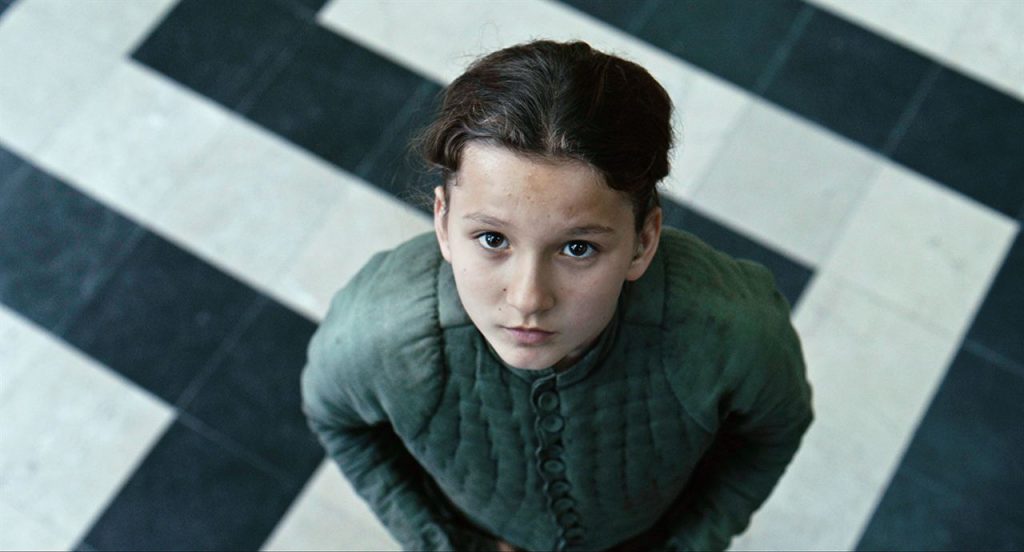
Lise Leplat Prudhomme in Joan of Arc. Directed by Bruno Dumont. Music by Christophe. (Les Films du Losange. All rights reserved.)
Un certain regard
A vida invisivel / The Invisible Life of Euridice Gusmão (Karim Aïnouz). Music by Benedikt Schiefer, Guilherme Garbato & Gustavo Garbato.
German composer Benedikt Schiefer teams up with Brazilian director Karim Aïnouz again, a year after the documentary Central Airport THF, about Berlin’s once largest airport, now a refugee shelter. The Invisible Life of Euridice Gusmão tells the story of two rebellious sisters in 1940s Rio de Janeiro, at a time when Brazilian women were invisible and unconsidered by society. According to various sources, Schiefer collaborated with brothers Guilherme and Gustavo Garbato for this score, and that is great news, because their score for the fantasy drama Good Manners (2017) was a landmark in modern film score.
Jeanne / Joan of Arc (Bruno Dumont). Music by Christophe.
Let’s get straight to the point: Jeannette (2017) was everything you expected not to see at the Cannes Film Festival – even according to the Directors’ Fortnight’s standards, where it was screened. A crazy film with crazy ideas, entirely shot on location, it was both a hilarious retelling of the youth of Joan of Arc and an off-limits musical, all at once, with music composed by Igorrr who summoned elements of techno, black metal, baroque music and rap. For this sequel, the French DJ passes the reins to composer, singer-songwriter and pathological cinephile Christophe, whose previous scores are miles away from the pop and variety songs he has been famous for, over the last 50 years. A glimpse of it can be heard in the first trailer, and according to it, despite the changes of setting and composer, it seems it has lost nothing of its ecstatic electro vibe.
Papicha (Mounia Meddour). Music by Rob.
Even though Rob, one of the most talented French film composers, is a household name for horror film aficionados – his score for Maniac (2012) is easily one of the brightest efforts of the decade in film music – he has earned particular distinction with unconventional dramas as well. Papicha, the first feature film by Mounia Meddour, falls into the second category, and tells the story of a group of women trying to free themselves from the yoke of Islamic groups during the Algerian Civil War in the late 1990s. No doubt that the theme of the film, coupled with the composer’s cutting-edge style, will definitely make Papicha something we will be placing our hopes in.
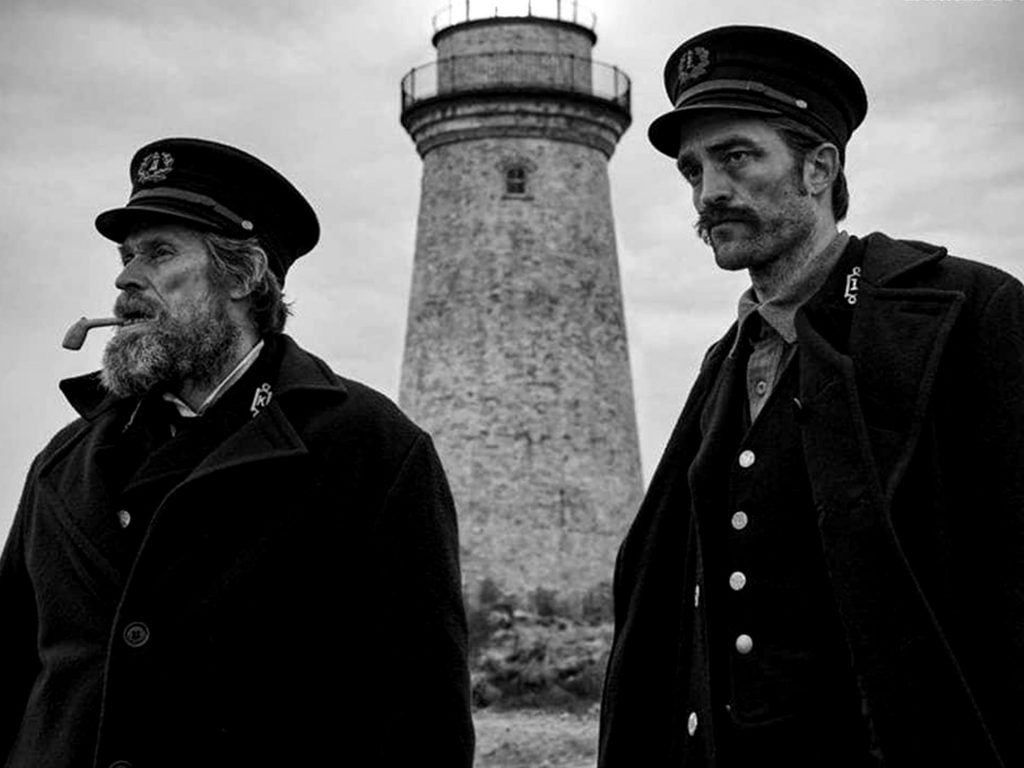
Willem Dafoe and Robert Pattinson star in Robert Eggers’ latest horror film The Lighthouse. Music by Korven. (A24. All rights reserved.)
Directors’ Fortnight
Le Daim / Deerskin (Quentin Dupieux).
Quentin Dupieux takes over the Directors’ Fortnight’s opening night with Deerskin, starring Jean Dujardin as a 45-year-old man who becomes obsessive about his latest acquisition… a deerskin jacket. The most unconventional director of our times will probably also score his latest film under his (even more famous) alias Mr. Oizo – there is still no information about the score yet, but Dupieux has scored all his previous films, sometimes in collaboration with David Sztanke and his electro-rock band, Tahiti Boy and the Palmtree Family. After Rubber, Wrong and Wrong Cops, here’s another Dupieux score that you will probably need in your record collection.
Hatsukoi / First Love (Takashi Miike). Music by Kōji Endō.
Kōji Endō has scored no less than 37 Takashi Miike films – but in all relativeness, Miike has made over a hundred films, series and video games in his 30-year career. Comedy, horror, noir, science-fiction, western, thriller… Not only have they done pretty much every possible genre and subgenre in the history of film, but they even went further by mixing them in impossible ways. First Love, which features boxers, corrupt cops, yakuzas and drug smugglers, will be no exception to the rule, and Endō, despite his jazz-heavy musical base, can excel in one style or another, just like his colleague. We can say, with some degree of confidence, that this time too.
The Lighthouse (Robert Eggers). Music by Mark Korven.
We loved Robert Eggers’ The Witch. So did everybody. We also loved its nightmarish score. So did everybody. We are expecting so much from their new collaboration. What about you? Oh, don’t say it… We can tell.
Les Particules (Blaise Harrison). Music by Èlg.
This auteurish science-fiction film with its curious plot – a secondary school student sees his world unravel because of a particle accelerator located a hundred metres under the ground – obviously needed a curious score. Laurent Gérard, a.k.a. Èlg, has been composing experimental bacchanals for the last fifteen years and, we warn you, you are not ready for it. Nonetheless, his pieces, although largely hermetic, include collage, minimalism, saturated noises, resulting in some kind of psychedelically operatic compositions that have an undeniable cinematic value.
Zombi Child (Bertrand Bonello). Music by Bertrand Bonello.
Bertrand Bonello left us three years ago with his post-Paris attacks drama Nocturama, which summoned the influences of horror masters John Carpenter and George Romero and the ghosts of Alan Clarke and Stanley Kubrick. Zombi Child will probably have more to do with horror, because it will explore the Haitian legends about the undead. The director, as usual, will also compose the score… With more Carpenter influences?
Red 11 (Robert Rodriguez). Music by Rebel Rodriguez.
Yes, Rebel Rodriguez is the 20-year-old son of From Dusk Till Dawn director Robert Rodriguez. And yes, it is the first time he has composed a film score. Red 11 is based on the director’s own experience, when, back in 1991, he signed up to become a lab rat in a pharmaceutical clinic, earning a few hundred dollars after the experience, that he would spend for the making of his first feature El Mariachi. Let’s be honest: Rodriguez’s films often are a demonstration in bad writing, poor acting and uninspired directing – he calls this guerrilla filmmaking. But if there is one thing Rodriguez is good at, it is composing enjoyable music, based on his classic rock’n’roll and Mexican music influences. Let’s hope that young Rebel has had good advice from his father.
The Staggering Girl (Luca Guadagnino). Music by Ryuichi Sakamoto.
From Yellow Magic Orchestra to Merry Christmas, Mr. Lawrence, to The Revenant, very few musicians and composers can boast such a complete career in both music and film score as Ryuichi Sakamoto can. For his part, Luca Guadagnino surprisingly directed a 35-minute short film as a follow-up to his now film classics Call Me By Your Name and Suspiria – the score of which we still haven’t gotten over. Sakamoto and Guadagnino team up for the first time with this Staggering Girl, which stars Julianne Moore, Marthe Keller, Kyle McLachlan and Alba Rohrwacher. In other words, the finest cast and crew of world cinema. Don’t you feel convinced already?
Written by Valentin Maniglia, edited by Marine Wong Kwok Chuen
P.S.: Cannes will also host several events in relation to film scoring and composers. French director and film historian Bertrand Tavernier, who helped rediscover many film scores from French films of the first half of the 20th century, will present a new episode from his series My Journey Through French Cinema dedicated to French film scores (May 20th). At the Directors’ Fortnight, the Master of Horror himself, writer, director and composer John Carpenter, will receive the Golden Coach, given by the French Directors’ Guild (May 15th). And we will of course follow the 9th edition of the Cannes Soundtrack Awards. The name of the winner will be revealed at the end of the Cannes Film Festival.
